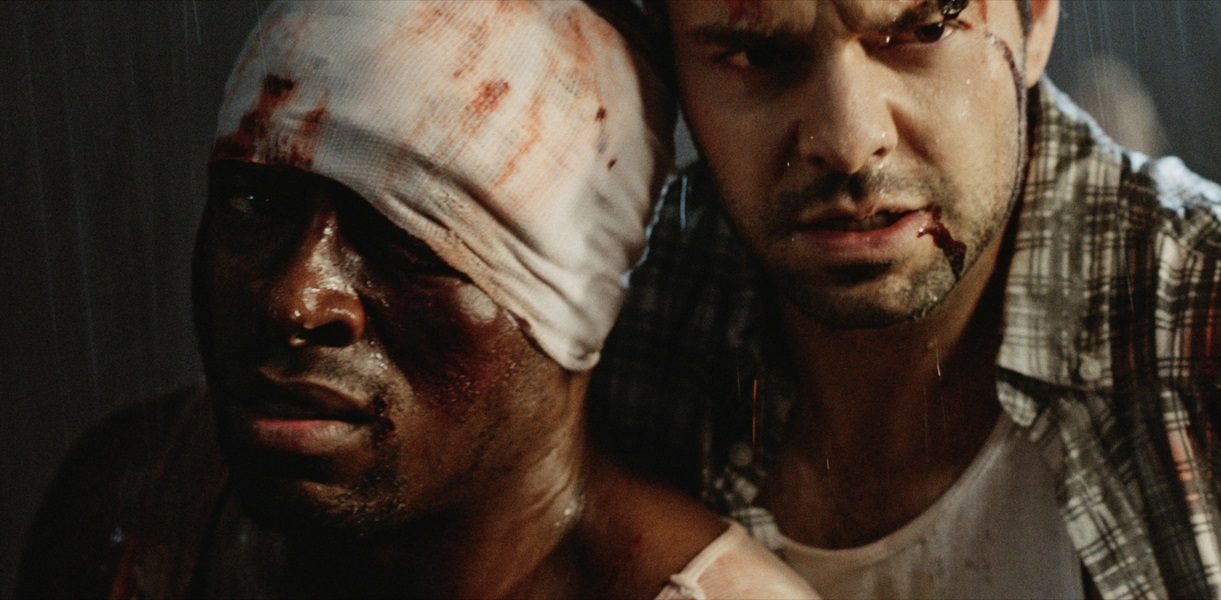Actor/director Alexander Bedria‘s short film The Zim effectively tells the story of the real-life farm seizures in Zimbabwe during the early 2000s, where white farmers had their land forcibly removed from them with the seeming intention of redistributing land to the black population. We talked to Alexander about the eventful making of the film and his inspiration for it.
I saw your film yesterday and I was really impressed by it. Was there a personal connection between yourself and the material?
You know, interestingly, I didn’t have a personal connection to the subject matter. I had a friend who was living in Zimbabwe over the course of a few years who would share stories about the people he met who were on both sides of the conflict. At the time, I was searching for subject matter to explore, and I think that there was something about the nature of what was happening and had happened that fascinated me.
Was the friend instrumental in helping to write the script?
My friend told me a particular story about a farmer and his experience when his farm was invaded and that planted the seed of the story. The script itself was assembled over many months of research – reading news reports and books, viewing documentary footage and speaking to Zimbabweans. I would say that a huge contributor towards this authenticity was Tongayi Chirisa. He’s from Zimbabwe and really put my feet to the fire in terms of ensuring that everything was as close to the reality of the situation as possible.
Was it easy to maintain the balance between telling the white and black perspectives of the narrative?
No, that was a very delicate balance that was discussed and prodded over and worked on all the way through production and into the editing room. We’re telling a story that is based on real events and the people who endured them are one day possibly going to see this film. That balance and awareness was something that was very important to me and Tongayi.
Was it easy to recruit Zimbabwean actors to play the antagonists, given the sensitivity of the subject matter?
Well, interestingly enough, I don’t believe that any of the actors playing the war vets were Zimbabwean. Many of them hailed from different parts of Africa actually. I was searching for as many Zimbabwean actors in Los Angeles to play the characters as possible, but I found that it was limiting because many of the Zimbabwean actors that we had found didn’t quite understand how we were going to be able to tell this complex story.
Given these casting difficulties, did this issue increase the importance to maintain a level of authenticity that wouldn’t throw off any potential Zimbabwean viewers?
100%. As a matter of fact, with the actors that I mentioned above, we would do rehearsals where Tongayi, myself, the actors and our cinematographer Matthew Macar would go out to a local park in the Hollywood area and practise the language and the chants that you hear in the movie.
Were there any difficulties in filming the intense confrontation scenes?
Those scenes were filmed on the last day and we shot all the way until sunrise because we really needed to pull these sequences off as smoothly as possible. After the first take, I was brought to the ground by a group of the guys involved and my cheek got sliced and started bleeding. Fortunately after that, it was much calmer and the guys realised that they had to save their energy for the close-ups.
The film itself received a lot of critical acclaim when it was screened at film festivals in 2018 and was even put up for Academy Award consideration.
Yeah, when we won the LA Shorts Fest, we qualified for an Oscar nomination.
What was it about the film that you think appealed to festival audiences and juries?
I think the aesthetic of the film was an important factor. It was important for me to make the film discernible from a big budget studio production, yet appear more professional than what you would expect from a low budget short film festival entry. The narrative is pretty rounded and structured, which is in a way a throwback to the American Western. It’s telling a new story, but in an old-fashioned and nostalgic way, and I would guess that is something that isn’t quite as common in a short film festival.
Do you feel that the film has a social potential in terms of healing the racial divide between white and black Africans through its online release?
I feel a little pretentious saying this, but I really hope that this film starts a conversation. Conflict becomes violent when conversation is closed, and I hope that this film provokes a conversation that comes to the conclusion that the only way to move forward is if we all move together. That’s certainly not just something that needs to be learned in Zimbabwe, it’s something that we can all be reminded of.
What future projects do you have in the pipeline and would they be available for UK audiences any time soon?
I recently had a great guest-starring role on NCIS: Los Angeles, which I think is available in the UK. It’s an episode called ‘Watch Over Me’ which aired recently in the US. I also have a feature film coming up called Aftermath, which stars Ashley Greene and Shawn Ashmore. It’s a thriller that I did last year that should hopefully be coming out this year in some form.
Alex, it’s been great talking to you and the best of luck for the future.
You as well, man.
The Zim will be available to watch on Vimeo from Tue 2 June 2020.
